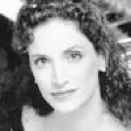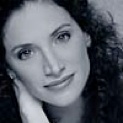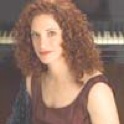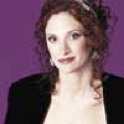Composer/pianist Robin Spielberg and I have been close friends for about seven years. We met on the Internet in a newsgroup about New Age Music, and began corresponding. Robin came to Northern California in early 1998, and performed her first Northern California concert at the Lesher Center in Walnut Creek and did a workshop here the following day. Robin has recorded twelve albums, and recently published her fourth songbook. Robin and her husband, Larry Kosson, live in New Jersey with their daughter, Valerie. We spoke by phone in mid-September, and had an in-depth conversation about her life and career. Here is our interview:
KP: So, what’s going on in New Jersey today?
Spielberg: Today was a very big day! It was Valerie’s first day of kindergarten! She was very excited, but her teacher was comforting me! I’m glad it was that way and I didn’t have a crying child!
KP: How old were you when you started playing the piano?
Spielberg: Lessons began when I was seven, but I was playing by ear before that. I’ve played by ear, really, my whole life. I read music and am classically trained, but my first teacher had a different approach which was both a hindrance and a blessing. The blessing was that she accepted that I didn’t have a lot of patience and was kind of hyper. I had trouble sitting still, and a few minutes into my lesson, I’d get up and walk around the room! My teacher wasn’t at all flustered. She’d get up, too, and we’d walk around clapping the beat, or she’d put on a record, or we’d make up a silly song. Then we’d sit back down - she just kind of followed my lead. It was all about it being fun, and lessons were very relaxed and casual. To me, my teacher was a star because she was in the community theater. I’d go and see her in the lead role of a play or musical, and I’d think, “She’s famous!” I put her at the goddess level very early and wanted to please her, so I did well. Her style of teaching was a hindrance in that when I went on to more traditional lessons, it was a really big adjustment for me. It was so much more serious! I’m really glad I had that playfulness early on because I think I still have it in my playing as well as in my teaching when I do master classes. I had my first piano teacher for a few years, and I think it was the end of the second year when she fully realized that I wasn’t reading music very well. She would play a piece for me to introduce it, and then I would play it. She’d put the music in front of me, but after hearing a piece once, I was able to play it by ear. I thought she was putting the music up there for her own use! I would be polite and copy what she was doing, which was to occasionally glance up at the music and then down at my fingers. One day, I guess she had caught on, so she put the music in front of me upside down, and I continued to play everything perfectly. She reprimanded me, and I started to cry, not knowing what I did wrong. She asked how I was reading the music when it was upside down. I couldn’t answer her. I was doing very well and was playing my pieces perfectly, but I wasn’t reading. The next year was my “torture year.” Nothing was played for me, and I didn’t listen to records. I had to read the music, and that was not fun. I felt like I was going backwards because my playing wasn’t as good, but it was an interesting lesson for both of us.
KP: How advanced did you get before you had to start reading?
Spielberg: I was using the John Thompson books, and got to the third or fourth book without ever reading the music. I could read the notes, but I couldn’t read them very well, so I’d stutter along. Being able to play by ear is a very handy skill to have if you become a professional musician.
KP: I agree. It’s not necessarily a bad thing - especially if you play the pieces accurately!
Spielberg: Especially if the person you are mimicking is good! If the person you are mimicking is not good, that could be a problem! Anyway, I went through a number of teachers, some serious and some not so serious, getting the best from each. One was great for the classical repertoire - that’s all we did. When I was in high school, I had a teacher who really liked improvisation and jazz. I resisted because it wasn’t music that was pleasing to my ear, but he was a really good teacher. He taught me blues scales, and would have me play to records and make up parts. Because my first teacher was in all these musicals, I wanted to learn show tunes. Show tunes were almost always part of the lesson. She would teach me with triad chords, and then I would arrange the songs. That started right away. When I compare notes with friends and colleagues who are pianists, I realize how untraditional that was.
KP: It’s great that you had such a variety of approaches.
Spielberg: Yes, and then over time, you find your own voice as an artist. To me, it’s a blend of all those things. I love the structure of classical, I love the melody of the great show tunes, I like to be able to improvise and make my own arrangements of songs, so it’s kind of a reflection of all of those styles and ways of teaching that have become a part of me.
KP: Were you a music minor in college?
Spielberg: I started as a music minor. I majored in drama and theater, and graduated with a Bachelor of Fine Arts degree in Drama. I took music classes, but they were just for fun.
KP: Did you continuously study piano through college?
Spielberg: No. I went to Michigan State for two years, and then transferred to New York University. At Michigan State, I was a communications major and was pre-law, but I really wanted to do drama. I played the piano for fun in practice rooms there, but I was not studying music. I needed a break because music was so intense for me. Later, as I was performing as an actor at NYU, I got a job playing in piano rooms in New York. My focus was on acting, so I did what all the actors do in New York - wait tables. When I was waitressing in a piano bar, I became good friends with Robin Goldsby, who was playing there. Her agent came in one day and Robin had me play for him. He set up some auditions, and I got the first job I auditioned for - it lasted for twelve years! It was one of those rare, union, steady jobs, and what was so amazing about it was that it wasn’t at night! I played for lunches, and sometimes breakfast. I played from 11:30-2:30 every day at the Grand Hyatt right next to Grand Central Station. When I subbed for the pianist who had the breakfast shift, I would play from 7:30 AM until 2:30 PM with a one-hour break, and then I was finished for the day. That left me time to audition, and if I got a part, I could do a show at night. I actually got my first big break in the theater at Lincoln Center doing a play called “Boy’s Life” with The Atlantic Theater Company, of which I’m a founding member. The play was eight shows a week, but I never gave up the piano job! I knew that the theater job would end at some point, but the piano job would keep going. I got up at 6:00 AM, played the piano from 7:30-2:30, took a subway to Lincoln Center, slept in my dressing room from 3:15-5:15, got up to eat, and then went to the ballet room to warm up (vocal and physical warmups that you do as an actor). They loved me at Lincoln Center because they thought I was so disciplined and was the first one there every night! Little did they know I was sleeping!
A lot of things changed in my life, but that piano job was always there. I really grew around that job, and it began to define me. It didn’t in the beginning, but as I started incorporating my own music into the set, it became a very important place for me to feel centered, and to feel like an artist. I love acting and the theater - it’s fabulous - but the problem with being an actor is that you can’t sit in your living room and act. You have to wait for someone to grant you the permission to audition for a part, to get that part, then it’s short-lived and you start over again. You can sit in your living room and play the piano and write music. You can actually do your craft. When we founded The Atlantic Theater Company at NYU, David Mamet was our teacher. He and William H. Macy, a wonderful actor, taught us to not sit around and wait for things to happen. They said, “You create it. Write a play, direct a play. Work with your friends, work with this group. Make your weaknesses your strengths.” The ensemble is now going into its twentieth year. Things go in circles because now my husband and I have started an artists’ agency (SMG Artists), and we represent The Atlantic Theater Company on tour!
KP: Are Macy and Mamet still involved?
Spielberg: Yes. They were our mentors. William H. Macy directed “Boy’s Life,” and he and David Mamet gave me my first composing gig. David wrote an adaptation of Chekhov’s “Three Sisters,” and Bill was directing it. I was understudying the parts for all three sisters! I got the chance to write the music that underscored the play, and that afforded me the opportunity to write Russian-sounding period music. The music was written for accordion, mandolin, guitar, and violin, and it was played off the side of the stage. I was in the play a couple of times to sub for an actor, but I also had the music. Those were really fun days. I wrote a children’s play that toured with Atlantic (“Balloonland”), and that’s something I might do again - I’d like to take it on the road.

I’m still involved with the theater company, but I haven’t auditioned for a play since the mid-90’s - I haven’t had an interest in doing that - but I took everything that I learned from the experience of working with David and Bill and the company, and put it into my music. There’s a real parallel insofar as “Create your own work, create your own show.” If you want to tour, create a tour. I get so many calls from artists asking “How do you get a tour? How do you get bookings?” I don’t have a specific answer for their own journey, but for me, it was just one foot in front of the other. If you want to be on tour, make one. Rent the hall, make it, do it, and eventually, it comes to you. Just keep doing your good work.
KP: Your first album (“Heal of the Hand”) kind of fell in your lap, didn’t it?
Spielberg: When I look back, it seems that way, but it took a long time. I wrote the music over a six-year period, and I knew I wanted to record it one day, but I wanted it to be really ready and of a very high quality. I was so naive - I sent out letters of inquiry to some of the labels, and wondered why I never heard anything back. I didn’t have a demo, and didn’t have any idea of how the system worked. It was 1993, and people were just starting to put out CDs on their own. A fan who was really into my music loaned me money, and I did the rest on a credit card! It was scary, and I went into major debt over the thing. I sent it to a couple of labels, and North Star grabbed it right up. The next week, I signed a contract for six records. All the debt went away, I bought my Steinway, and I was on my way. It was good timing because I was really ready then. I’m very grateful to North Star because they championed my early work and created an audience for me, but I couldn’t go out and tour. I was selling all of these recordings, but didn’t know who my audience was. That’s a really tricky issue right now because there is so much out there, and the record industry is in such transition. Few artists know how to really market their music and get it out to the public, and I think it’s hard for artists to find out who their audiences are. With SMG Artists, that’s one of the challenges we face every day. Our agency represents five artists, not just me anymore. I love all kinds of performers, and I’ve always wanted to help the good ones get on their way. It’s delightful that we’re doing this now - it feels really right. Currently, we have the theater company, a Grammy Award-winning brass quintet called Chestnut Brass, a violinist named Janice Martin, me, and a cello and guitar duo called Montana Skies.They’re really young, write great original music, and play classics as well. They have done two records, and I’ve started working with them as a trio. We’ll be touring as a trio in ‘04 and ‘05.
KP: You do everything! Is Larry pretty involved with this, too?
Spielberg: It’s really Larry’s thing! He’s the agent and goes to all of the music conferences. When I’m not on tour, I do the administrative part of it. I’m the number cruncher of the family; Larry hates it, but I enjoy it! I do the accounting, and we work together on the press kits. I work more on the artist relations - if an artist is having a problem on tour or something. I also do the website. Five artists is about all we can handle right now, but we can grow, and then we’ll hire another agent. We want to stay small so we can give everyone a good amount of attention. If an agency’s roster has ten violinists or thirty conductors or four brass bands, it’s very hard on the artists, so we’re trying to keep it pretty diversified. Submissions are pouring in like crazy, and we haven’t even done a press announcement yet. Word has gotten out! We’re both sensitive about submissions, and Larry and I look at and listen to everything.
My career has come full circle. I made my first CD myself, signed with a label, and then I started doing it on my own again with my own small label. With the sheet music, I did my first book myself, then I found a sheet music publisher, and now we’re doing it with our own company. I’ve worked with agents, and now we have our own agency! It’s come together to where it’s all under our own roof - music production, recording, touring. It’s our family business, really.
KP: How did the name playMountain come about?
Spielberg: “playMountain” is what I named the record label, and it’s the definition of my last name. “Spiel” means to play, and “berg” means mountain. It was a European musical term that means “play to the peak.” I was sure that Steven Spielberg would take that for the name of his own production company, but he didn’t! So I did! The names of our companies are plays on my name. There is Spobs Music for publishing, and “Spobs” is a nickname that I got in college. It’s very silly, but it came from calling me “Spobin Rielberg, ” like you would be “Pathy Karsons,” switching the first letters of your name.

For some reason, “Spobin” stuck and got shortened to “Spobs,” so when I was looking for a name for my publishing company, I figured it wouldn’t be anything that anyone would really see. I didn’t think about it being on business cards, sheet music, or stationery, or that people would be calling up asking for “Bob’s Music.” “Spobs” drives Larry crazy! My entertainment attorney told me that I had to find a name for my publishing company for ASCAP and for legal reasons, so that was it. I didn’t think it was going to grow like it did! We had a contest once in my online newsletter for people to define Spobs. In concerts, I explain what it means because that’s the question I’m asked most often - right after “Are you related to Steven Spielberg?” (which, by the way, I’m not sure.) The winner was “Spielberg Plays On a Big Steinway.” I thought that was great! Anyway, when it came time to name the agency, I didn’t really want my name in it. Everything we came up with was already taken except “Spobs”, and Larry said “No!” We did a lot of searches and gave about ten names to the lawyer, but everything was already taken. We were coming down to a deadline for filing papers or something, so we settled on “Spobs Management Group.” We’re known as SMG Artists. We can’t get away from Spobs!
KP: How did you become the celebrity spokesperson for the American Music Therapy Association?
Spielberg: That also sounds like it happened overnight! For my daughter,Valerie, to start kindergarten today was a very big event for more reasons than she was starting school. She is going to kindergarten against all odds - I think that’s what made me so emotional this morning. She was born four months premature, and is a surviving twin. They were born too early and were too little - I was only 23 weeks pregnant. I had a great pregnancy except it was too short, and no one knows exactly what went wrong. Valerie had to stay in intensive care for four months, which was very hard on her, and hard on us. It was a very emotional, crazy kind of time. No one could visit her, no one could touch her - her eyes weren’t even open yet; they were fused shut. She was on a respirator for six weeks and had heart surgery. It was a roller coaster ride. One day we’d hear that the baby did well, and the next day it was, “Say your final words to her - she’s dying.” That happened many times. Life is so incredibly fragile at that stage. I could hold her in the palm of my hand - she only weighed a pound at birth. We visited with her and kind of held a vigil there at the hospital. There wasn’t much we could do except pray and hope. She had to go into an incubator because she was so small. She was wrapped in Saran Wrap because her skin was so delicate it would fall apart. She was the size of a Beanie Baby. At the hospital, they encouraged us to communicate with her - to sing, to talk with her, to try to bond. At that early age, babies can handle very little stimulation, and there are a lot of stimuli in a hospital. They can’t help it! The lights have to be on, and machines are beeping and making noises, and this is distressing to babies.
Very early on, I brought in my music, and the nurses noticed that when the music was playing near Valerie at a very soft volume, her vital signs improved. It helped the babies around her, too. It wasn’t a fluke, because it went on for four months, and it was very consistent and very clear. As a musician and as a mommy, I knew that music makes you feel better. Over the years, I have received hundreds of beautiful letters from people saying my music has helped them get through difficult times. This was different, though, and the reason it was different is that this was a baby who wasn’t even quite a baby yet - she was more of a fetus. Her heart and lungs were still developing and her eyes were shut - how could there be this response? What is going on physically in the human body when it listens to music that is pleasing or not pleasing? I became very fascinated with that because it wasn’t subjective anymore. It wasn’t like someone saying “I like jazz. It makes me feel groovy.” It’s as clean as it gets as far as case study goes. I started poking around on the Internet, finding articles on music and healing, and doctors and other people who knew what was going on would point out articles on music therapy for me to read. I started going to the Journal of American Medicine website and reading all these different studies on music and its effects on the physical body. This is about heart rates slowing, oxygen saturation levels in the blood, measurement of endorphin levels - things like that. In my searches, I stumbled across the American Music Therapy Association website (
www.musictherapy.org), which is full of information. I wrote to them, and we started a conversation about what was going on with Valerie. That was about five years ago. Two years ago, we had a meeting in Washington. They were looking for a spokesperson who would advocate on their behalf without any promise of personal gain in their career - someone who has lived through this. I really wanted to bring attention to what the organization does, and to enlighten people.

My job as their spokesperson is to let young people know that there are careers in music therapy - I speak to a lot of college and high school students. It’s a rapidly growing field, and it’s where a love for healing and medicine and a love for music meet. If I had known about it when I was in college, I probably would have majored in it. Most people don’t even know music therapy exists, so I’m trying to change that. I also go to hospitals, community centers, and schools, and do workshops. I talk about my experiences with Valerie and do a mini-performance, and then a Certified Music Therapist talks about the training, what the day-to-day work is like, and the different applications for music therapy - working with the elderly, Alzheimer’s patients, young babies, children with autism, people having chemo, working in hospitals. Eventually, the music therapist will be accepted as part of the healing team. I think where it is now is where acupuncture was a decade ago. People thought it was too new and weird, and now insurance is covering it. Same thing with chiropractic medicine. That’s what’s happening in music therapy. Some of the insurance companies are starting to cover it, and the reason they are doing so is that they cannot ignore the evidence. If you have a music therapist in the hospital, the patient needs less pain medication and gets discharged earlier - this translates into dollars saved. Hospitals cannot ignore the facts, even if they do still think it’s voodoo! Music therapists are working alongside physical therapists, occupational therapists, psychologists, oncologists, and whatever is needed - they are part of the team. It’s a very powerful thing. I’m really enjoying my relationship with AMTA, and look forward to their national conference in Minneapolis in November, where I’ll be their headliner/entertainer. More importantly, Larry, Valerie, and I will be sitting on a panel and speaking as a group for pediatrics and young babies. I’ll get to meet my idol, Dr. Jane Stanley, who has devoted her 30+ year medical career to studying the effects of music in the neonatal intensive care unit.
KP: Since music has been such a huge part of Valerie’s life, is she showing a strong aptitude for music?
Spielberg: I don’t think any more than the average kid. She is very anti-piano at the moment. No one should be playing the piano. We wrote a song called, “Mama, Stop Playing the Piano!” It’s a very funny boogie woogie song, and the whole chorus is “Mama Stop, Mama Stop!” She loves to sing - that’s her thing. She sang for the first time at one of my concerts last month. A couple of years ago, it was really easy to take Valerie on tour because Larry stayed backstage with her while she slept and I performed. Last year was much harder because she wasn’t quite old enough to sit in the audience, but she wouldn’t stay backstage with a babysitter either. If I put her in the audience, she’d start talking to me - “Hi Mom!” This year, she started being able to handle being in the audience. She sits in the back, and if she gets too antsy, Larry takes her out. Whenever I’m practicing and she’s getting mad because I’m not paying attention to her, I tell her she needs to wait her turn, and then when I’m finished, we play a game or sing songs. During this concert last month, she turned to Larry during the first half of the show and said “Mommy has a really long turn!” She wanted a turn! So when we started the second half of the concert, I let her run out onstage. I told the audience that she wanted a turn and asked everyone if it was okay. They said it was fine. She was just four, and she’s still so cute! She stood on the piano bench, and I accompanied her as she sang “Yellow Bird.” Then she took a bow and ran offstage! I didn’t want to follow that! The audience loved it because I talk about Valerie and they know that she’s there. I think it’s heartwarming for them to see that she’s okay.
KP: Who do you consider to be your major influences?
Spielberg: David Mamet - perhaps a strange musical influence, but he’s my biggest one! More than giving me my first composing job, he gave me a whole philosophy of working: the idea of the structure of the day, to always have an objective, and to work on being in the moment. It really is a good philosophy for any kind of work, and applies very much to what I do. As an artist, there is no structure around you, so you have to create it for yourself. It can be hard to sustain over a period of time, because not everything is Carnegie Hall. Not everything is that high point. To be able to do the day-to-day things, you have to have the enjoyment of the routine things, to take some of the things that might be drudgery and have a way of working them that creates a balance. Secondly, I would say my parents influenced me equally because they really fostered the music education in my life. Both of them were like walking songbooks - my mother especially. She knows any song before 1962, and she’s still teaching me stuff. They also often took us to the theater, Broadway shows, and to concerts to cultivate an interest and keep it going. They afforded us ballet, violin, piano, and organ lessons, so there was opportunity. How do you know what you’re good at unless you get a chance to try it? I’m so incredibly grateful to both of them for giving me the chance to try things. My other influences are all those great dead men who wrote all that great music! All kidding aside, I think it’s easy to be inspired as a pianist. How could you not be? You could never learn it all in a lifetime. One of the things I love most about the piano is that no two people play it the same way. You don’t have to study very hard to hear the differences in how people play the piano. It’s such an amazing instrument - so versatile, and so incredibly expressive.

KP: When did you become a Steinway artist?
Spielberg: In 1996. Going into Steinway in NY is like going into a candy store, only you can’t afford the candy! It was one of my favorite places to hang out - I used to go in there all the time. Becoming a Steinway artist was one of those strange, serendipitous coincidences (or maybe it was just meant to be!). The year before I was going to play at Carnegie Hall, I wrote to Steinway that I was starting to tour, and that so many of the pianos in the various venues were just horrible. I’d ask what kind of a piano was in a concert hall, and they would say, “A big black one.” Many of them were what I would call firewood pianos. At other places, the pianos would look all beat up, but would be amazing instruments because the guts were good. I said in my letter that it be great to have consistency and asked what it would take to become a Steinway artist and have them provide pianos for my concerts. It just so happened that the president of the manufacturing division of Steinway was already a fan of mine. He’d come to hear me play a concert in New Jersey, and the same week that I wrote that letter, he went to the Artist Liaison and told him about me. He invited me in for a chat, and that’s how that came about.
KP: What’s coming up next for you?
Spielberg: I didn’t do any CDs this year, but I have my new holiday songbook. I’m also working with this trio, and I’m touring a lot. I’ll be playing in all of the New England states during the holidays and in quite a few states in the spring as well, so I have a lot going on. I’ve been more home-oriented the past several months, so I’m itchy to get back on the road. Ten years from now when Valerie is a teenager, I don’t think I’ll be running all over the country. One of the reasons that we’re building the agency is that maybe I’ll have a different role in that later on. I have a lot of touring left in me, so I want to do it now while I want to and it’s still a good time.
KP: What are you going to be doing in Montana this month?
Spielberg: Montana is going to be an adventure. I was spoiled this past year because I was traveling with my family. Now that Valerie is in kindergarten I’m going on my own. I have 3 1/2 weeks of work in Montana, and it’s based on a grant. There are six concerts throughout the state; sixteen school and community music therapy programs; and then some master classes and workshops. I’ll be literally combing thousands of miles of Montana.
Many thanks to Robin Spielberg for taking the time to tell us about her life and work! For more information, visit
her website or her
Artist Page here on MainlyPiano.com. For more info about SMG Artists, visit
smgartists.com.
Kathy Parsons
September 2003






